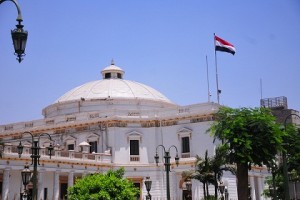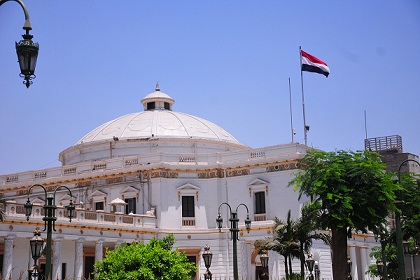
(DNE / FILE PHOTO / Hassan Ibrahim)
Following the finalisation of the draft law regulating Egypt’s upcoming parliamentary elections, political parties told Daily News Egypt they are concerned over how legitimate the vote’s outcome will be.
On Monday, the Electoral Districts Committee confirmed that the law has been prepared for cabinet approval this week, ready for elections in early 2015. The number of districts has been set at 231, with Cairo governorate having the most districts and Aswan the fewest.
To win a parliamentary seat a candidate will need 131,000 votes, with regulations stating that 77 districts will vote on one seat, 119 on two seats, and 35 on three seats. The seats will also be split according to the type of representative standing, with the vast majority reserved for independent candidates.
However, Hossam El-Kholy, member of the Supreme Committee of the Wafd Party, told Daily News Egypt his party has been concerned with the new electoral rules from the beginning, not simply the new district map. El-Kholy, who endorsed President Abdel Fattah Al-Sisi in the presidential election, feels that the new set-up will undermine the party, “with so many seats reserved for individuals, it will stop a strong movement of political parties”.
According to Article 3 of the house law, Egypt’s upcoming parliament will be comprised of 567 seats. Within that figure 420 (73%) will be reserved for independents, 120 (22%) will be for party-affiliated candidates, and the remaining 27 seats (5%) will be awarded to individuals appointed by the president.
El-Kholy said he expects parliament debates will become parochial following the election, limited to local issues of a representative’s constituencies rather than wider and more fundamental issues.
With parties unable to develop into complex organisations, the bigger issues will be left to the executive (the President) and so parliament will become easier to control, argued El-Kholy.
He said: “In every democracy in the world parties are the most important political agents in the system, but this law will dilute them.”
However, El-Kholy said that, whilst the party is against the new rules, Wafd candidates will still participate in the election.
Echoing Al-Kholy, Abdel-Ghaffar Shukr, chairman of the leftist Socialist Popular Alliance party, said the new rules will lead to the re-emergence of Mubarak-era figures.
“When you reserve two-thirds of seats to independents, this does a lot of harm to new political parties and helps the old Mubarak regime remnants, especially the wealthy businessmen, to dominate parliament again,” Shukr told Ahram Online.
However, the potentially stifling impact on collective movements are viewed positively by some parties. In an interview with Daily News Egypt, Alaa Essam, the Tagammu party’s legal attorney, said the best thing about the new rules is they will control the Islamist movement, whilst the role of alliances will keep parties strong.
“The Egyptian Front Coalition, among other alliances, are excluding Islamist parties from running with us,” said Essam, who worked on the legal case to have the Muslim Brotherhood organisation banned and its capital confiscated.
“The new law is not the best, but it’s relatively good – good enough for a democratic process”, Essam said. The Coalition will join an electoral alliance formed by Mubarak-era minister and current economic consultant to the Egyptian presidency Kamal El-Ganzouri.
Also running are two other coalitions associated with the Mubarak regime, and strong supporters of Al-Sisi’s government, the Tayar El-Istiqlal (Independence Current) and the Ma’an Tahya Masr Coalition.
Meanwhile, other parties have a fiercely critical view of how legitimate the outcome of the election will be, and for the moderate-Islamist Al-Wasat party the new laws are just a distraction. General Secretary Mohammed Abdel Aziz told Daily News Egypt: “The law is simply for the benefit of the coup. At the moment we are more concerned with working towards real democracy and freedom, fighting for political prisoners and human rights abuses. So we are not concerned with [the changes to the electoral districts] law.”
The party recently separated from the pro-Morsi Anti-Coup Alliance to work towards creating a new “inclusive alliance” to resist the current government and work with revolutionary groups. Abdel Aziz confirmed that the party will not be participating in the upcoming elections.
President Al-Sisi has said that the upcoming parliamentary elections will take place before the end of March 2015. The elections are the third pillar of the transitional roadmap declared by the interim government following president Morsi’s ouster in July 2013. But with players already heavily polarised before long before the election, hopes for a cohesive or even coherent political landscape look dim.

